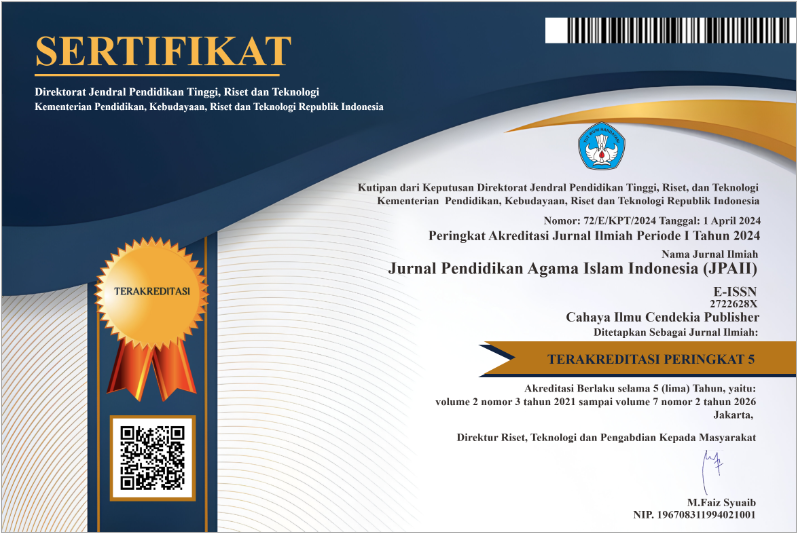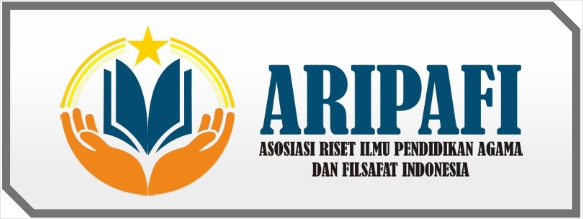The Effectiveness of Peer Assessment in Assessing Students' Spiritual Attitudes in Islamic Religious Education Learning in Middle Schools
Abstract
Purpose of the study: To determine the effectiveness of peer assessment in assessing spiritual attitudes in Islamic religious education learning in junior high schools.
Methodology: The research method uses a qualitative method with descriptive research type, the research sample is an Islamic religious education teacher in junior high school with research instruments in the form of interviews, research analysis using Mileh and Huberman.
Main Findings: Peer assessment in assessing spiritual attitudes is said to be effective because it has run according to its duties and functions in making it easy for teachers to evaluate student learning outcomes and train students so that they have skills when carrying out evaluations.
Novelty/Originality of this study: Many studies pay attention to cognitive aspects in assessment or learning, but this research highlights the spiritual dimension.
References
T. H. Nurgiansah, “Pendidikan Pancasila sebagai Upaya Membentuk Karakter Religius,” J. basicedu, vol. 5, no. 6, p. 6349_6356, 2021.
N. L. P. R. E. Agustini, "Character education for children in Indonesia", Journal of Educational Study, vol. 1, no. 1, pp. 97-102, 2021, doi: 10.36663/joes.v1i1.158
E. Ferdiawan, and W. E. Putra, "Esq education for children character building based on phylosophy of Javaness in Indonesia", Procedia-Social and Behavioral Sciences, vol. 106, pp. 1096-1102, 2013, doi: 10.1016/j.sbspro.2013.12.123
A. Efferi, “Model Pendidikan Guru Dalam Meningkatkan Mutu Pendidikan,” J. IAIN Khudus, vol. 3, no. 2, pp. 237–256, 2015.
Y. Jamiah, F. Fatmawati, and E. Purwaningsih, "Internalization of students’ nationalism sense through outbound learning based on local wisdom", Journal of Education, Teaching and Learning, vol. 4, no. 2, pp. 339-344, 2019, https://www.learntechlib.org/p/216973/.
M. Afrina, J. Siska, O. L. Agusta, R. N. Sasongko, and M. Kristiawan, "The policy of mover school as a catalyst for improving the quality of education", JPPI (Jurnal Penelitian Pendidikan Indonesia), vol. 8, no. 1, pp. 108-115, 2022, doi: 10.29210/020221639
E. Sulistiani and Masrukan, “Pentingnya Berpikir Kritis dalam Pembelajaran Matematika untuk Menghadapi Tantangan MEA,” Semin. Nas. Mat. X Univ. Semarang, pp. 605–612, 2016.
B. Uyuni, and M. Adnan, "The Challenge of Islamic Education in 21st Century", SALAM: Jurnal Sosial dan Budaya Syar-i, vol. 7, no. 12, pp. 1079-1098, 2020, doi: 10.15408/sjsbs.v7i12.18291
P. M. Wright, and G. C. McMahan, "Exploring human capital: putting ‘human’back into strategic human resource management", Human resource management journal, vol. 21, no. 2, pp. 93-104, 2011, doi: 10.1111/j.1748-8583.2010.00165.x
F. K. Zukhrufin, S. Anwar, U. Sidiq, and U. M. Ponorogo, “Desain Pembelajaran Akhlak Melalui Mata Pelajaran Pendidikan Agama Islam,” J. Islam. Educ. Vol., vol. 6, no. 2, pp. 1–19, 2021, [Online]. Available: http://repository.iainponorogo.ac.id/857/.
S. Latief, Y.A. Sari, M. Yusuf, A. Armila, and R. E. Hidayat, "The Development of Islamic Education and Strengthening of National Education System of Indonesia", International Journal on Advanced Science, Education, and Religion, vol. 4, no. 2, pp. 86-99, 2021, doi: 10.33648/ijoaser.v4i2.105
J. Berglund, "Islamic religious education in Muslim schools: a translation of Islam to the Swedish school system", Religious Education in a Global-Local World, pp. 109-121, 2016, doi: 10.1007/978-3-319-32289-6_7
Tsaniyatus Sa’diyah, “Penerapan Pembelajaran Pendidikan Agama Islam Dalam Membentuk Karakter Pribadi Yang Islami,” KASTA J. Ilmu Sos. Agama, Budaya dan Terap., vol. 2, no. 3, pp. 148–159, 2022, doi: 10.58218/kasta.v2i3.408.
A. Abdul Razak, F. Jannah, and K. Saleh, “Pengaruh Pembelajaran Pendidikan Agama Islam Terhadap Perilaku Siswa di SMK Kesehatan Samarinda,” el-Buhuth Borneo J. Islam. Stud., vol. 1, no. 2, pp. 95–102, 2019, doi: 10.21093/el-buhuth.v1i2.1582.
I. Ismail, "Character education based on religious values: an Islamic perspective", Ta'dib: Jurnal Pendidikan Islam, vol. 21, no. 1, pp. 41-58, 2016, doi: 10.19109/td.v21i1.744
Fanreza, “Pendidikan Agama Islam Dalam Keluarga Dosen Tetap Al-Islam Kemuhammadiyahan Di Universitas Muhammadiyah Sumatera Utara,” Angew. Chemie Int. Ed. 6(11), 951–952., vol. 9, no. 2, pp. 141–161, 2017.
B. A. Sumantri and N. Ahmad, “Teori Belajar Humanistik dan Implikasinya terhadap Pembelajaran Pendidikan Agama Islam,” Fondatia, vol. 3, no. 2, pp. 1–18, 2019, doi: 10.36088/fondatia.v3i2.216.
J. M. Halstead, "Islamic values: a distinctive framework for moral education?", Journal of moral education, vol. 36, no. 3, pp. 283-296, 2007, doi: 10.1080/03057240701643056
H. Setiadi, “Pelaksanaan Penilaian Pada Kurikulum 2013 The Implementation Of Assessment In The Curriculum 2013,” J. Penelit. dan Eval. Pendidik., vol. 20, no. 2, pp. 166–178, 2016.
A. Nurdin, S. A. A. Samad, M. Samad, and F. Fakrurrazi, "Government Policy Regarding Education in Indonesia: Analysis of Competence-Based Curriculum, Educational Unit Level Curriculum, and Curriculum 2013", Journal of Governance and Social Policy, vol. 4, no. 1, pp. 139-155, 2023, doi: 10.24815/gaspol.v4i1.31812
L. D. Gruppen, J. C. Burkhardt, J. T. Fitzgerald, M. Funnell, H. M. Haftel, M. L. Lypson, and J. A. Vasquez, "Competency‐based education: programme design and challenges to implementation", Medical education, vol. 50, no. 5, pp. 532-539, 2016, doi: 10.1111/medu.12977
R. Nurmalasari, R. Dian, P. Wati, P. Puspitasari, W. Diana, and N. K. Dewi, “55-Riana-Nurmalasari-Reta-Dian-Purnama-Wati-Poppy-Puspitasari,” pp. 722–733, 2013.
G. H. Achmad, D. Ratnasari, A. Amin, E. Yuliani, and N. Liandara, “Penilaian autentik pada kurikulum merdeka belajar dalam pembelajaran pendidikan agama islam di Sekolah Dasar,” Edukatif J. Ilmu Pendidik., vol. 4, no. 4, pp. 5685–5699, 2022, doi: 10.31004/edukatif.v4i4.3280.
M. Mastikawati, H. Baharun, A. H. Wahid, S. Solehatin, R. Adawiyah, "Strengthening early childhood learning outcomes through authentic assessment of students", Jurnal Obsesi: Jurnal Pendidikan Anak Usia Dini, vol. 6, no. 5, pp.4547-4556, 2022, doi: 10.31004/obsesi.v6i5.2525
E. Sihombing, J. Jufrizal, and S. Anwar, "Scoring Rubric as the Authentic Assessment Used by the English Teachers to Run the National Curriculum in South Sumatera, Indonesia", In Sixth International Conference on Languages and Arts (ICLA 2017), pp. 310-315, Atlantis Press, 2017.
S. S. Mukrimaa et al., Model Pembelajaran Berbasis Masalah Denganscaffolding Untuk Meningkatkan Keterampilan Berpikir Kreatif Mahasiswa Pada Mata Kuliah Biokimia I, vol. 6, no. August. Jambi: Komunitas Gemulun Indonesia, 2016.
Y. Ani, “Penilaian Autentik Dalam Kurikulum 2013,” Semin. Nas. Implementasi Kurikulum 2013, no. November, pp. 746–749, 2013.
J. T. Gulikers, L. Kester, P. A. Kirschner, and T. J. Bastiaens, "The effect of practical experience on perceptions of assessment authenticity, study approach, and learning outcomes", Learning and Instruction, vol. 18, no. 2, pp. 172-186, 2008, doi: 10.1016/j.learninstruc.2007.02.012
A. Wiguna, “Upaya Mengembangkan Sikap Spiritual Dan Sosial Peserta Didik Berbasis Psikologi Positif Di Sekolah,” AL-ASASIYYA J. Basic Educ., vol. 1, no. 2, pp. 47–61, 2017, doi: 10.24269/ajbe.v1i2.684.
S. N. S. M. Ariantini Putu, “Implementasi pengintegrasian sikap spiritual dan sosial dalam pembelajaran bahasa indonesia berbasis kurikulum 2013 di kelas VII SMP I Negri Singaraja,” vol. 3, no. 1, 2014.
A. Z. Sarnoto and D. Andini, “Sikap Sosial Dalam Kurikulum 2013,” Madani Inst. J. Polit. Hukum, Ekon. Pendidik. dan Sos., vol. 6, no. 1, pp. 39–50, 2017, doi: 10.53976/jmi.v6i1.277.
A. Pitriyani, S. Devung, and N. Anggal, “Implementasi Penilaian Sikap Spiritual dan Sikap Sosial Pada Kurikulum 2013,” Gaudium Vestrum J. …, vol. 4, no. 2, p. 57, 2020, [Online]. Available: https://ojs.stkpkbi.ac.id/index.php/jgv/article/view/65.
O. Kurniaman and E. Noviana, “Penerapan Kurikulum 2013 Dalam Meningkatkan Keterampilan, Sikap, Dan Pengetahuan,” Prim. J. Pendidik. Guru Sekol. Dasar, vol. 6, no. 2, p. 389, 2017, doi: 10.33578/jpfkip.v6i2.4520.
A. Wijayanti, "Efektivitas Self Assessment dan Peer Assessment dalam Pembentukan Karakter Siswa," Realita: Jurnal Penelitian Dan Kebudayaan Islam, vol. 15, no. 2, 2017
Amirotun Sholikhah, “Statistik Deskriptif Dalam Penelitian Kualitatif,” Komun. Islam, vol. 10, no. No. 2 (2016), pp. 1–21, 2016.
T. Pramiyati, J. Jayanta, and Y. Yulnelly, “Peran Data Primer Pada Pembentukan Skema Konseptual Yang Faktual (Studi Kasus: Skema Konseptual Basisdata Simbumil),” Simetris J. Tek. Mesin, Elektro dan Ilmu Komput., vol. 8, no. 2, p. 679, 2017, doi: 10.24176/simet.v8i2.1574.
O. S. Simarmata, Y. Armagustini, and Bisara Dina, “Determinan Kejadian Komplikasi Persalinan Di Indonesia (Analisis Data Sekunder Survei Demografi Dan Kesehatan Indonesia Tahun 2007) Determinant Factors on Delivery Complication in Indonesia , 2007 ( in-dept analysis of Demographic and Health Survey 2007,” J. Ekol. Kesehat., vol. 11, no. 1, pp. 11–23, 2012.
E. F. S. Rini and F. T. Aldila, “Practicum Activity: Analysis of Science Process Skills and Students’ Critical Thinking Skills,” Integr. Sci. Educ. J., vol. 4, no. 2, pp. 54–61, 2023, doi: 10.37251/isej.v4i2.322.
S. Raibowo, Y. E. Nopiyanto, and M. K. Muna, “Pemahaman Guru PJOK Tentang Standar Kompetensi Profesional,” J. Sport Educ., vol. 2, no. 1, p. 10, 2019, doi: 10.31258/jope.2.1.10-15.
P. T. H. Thanh, and P. T. H. Thanh, "Learning Culture of CHC Students: Its Support and Challenge to Cooperative Learning", Implementing Cross-Culture Pedagogies: Cooperative Learning at Confucian Heritage Cultures, pp. 125-153, 2014, doi: 10.1007/978-981-4451-91-8_7
V. I. Marín, and A. P. Garcias, "Collaborative e-assessment as a strategy for scaffolding self-regulated learning in higher education", In Formative Assessment, Learning Data Analytics and Gamification, pp. 3-24, Academic Press, 2016, doi: 10.1016/B978-0-12-803637-2.00001-4
J. A. Alpízar, J. F. E. González, and N. V. Miranda, "Peer Assessment: A Complementary Tool to Promote Students' Autonomy", Revista de Lenguas Modernas, no. 30, 2019, https://revistas.ucr.ac.cr/index.php/rlm/article/view/38976
J. Fathi, and M. R. Khodabakhsh, "The role of self-assessment and peer-assessment in improving writing performance of Iranian EFL students", work, vol. 7, no. 3, pp. 1-10, 2019.
Copyright (c) 2023 Fitri Fitri

This work is licensed under a Creative Commons Attribution-NonCommercial 4.0 International License.
Authors who publish with this journal agree to the following terms:
- Authors retain copyright and acknowledge that the Jurnal Pendidikan Agama Islam Indonesia (JPAII) is the first publisher licensed under a Creative Commons Attribution 4.0 International License.
- Authors are able to enter into separate, additional contractual arrangements for the non-exclusive distribution of the journal's published version of the work (e.g., post it to an institutional repository or publish it in a book), with an acknowledgment of its initial publication in this journal.
- Authors are permitted and encouraged to post their work online (e.g., in institutional repositories or on their website) prior to and during the submission process, as it can lead to productive exchanges and earlier and greater citation of published work.






.png)
.png)





















